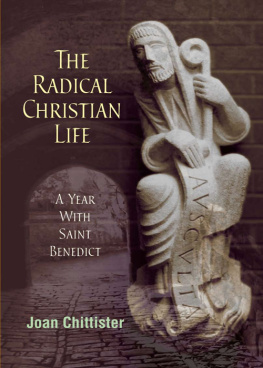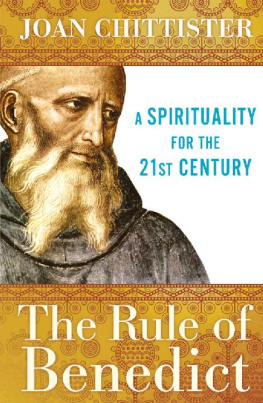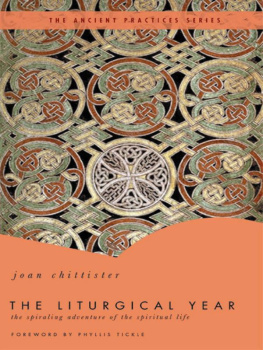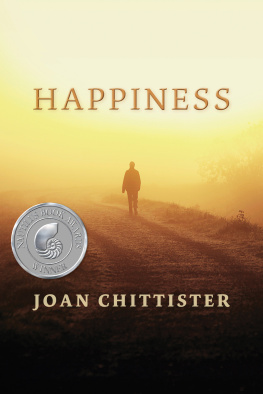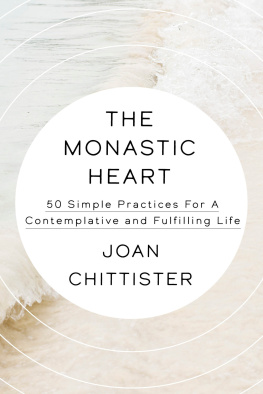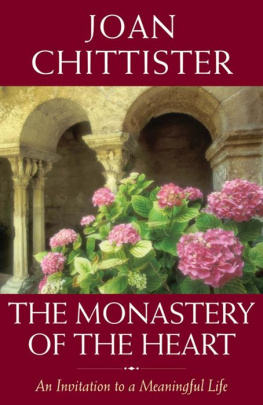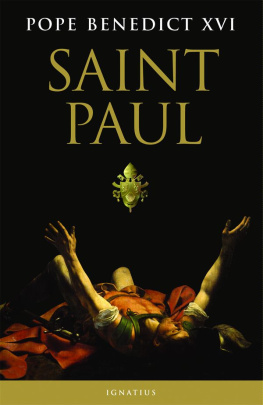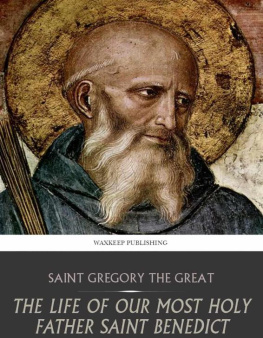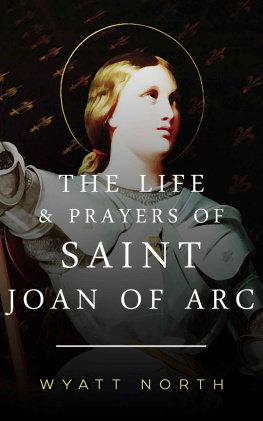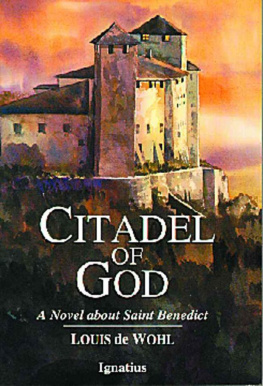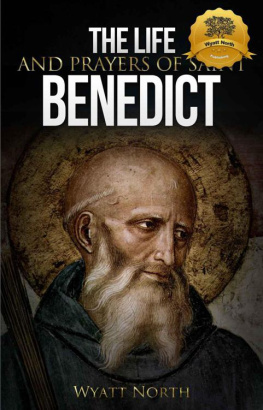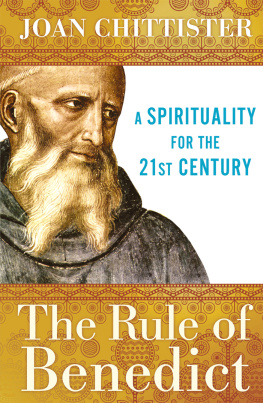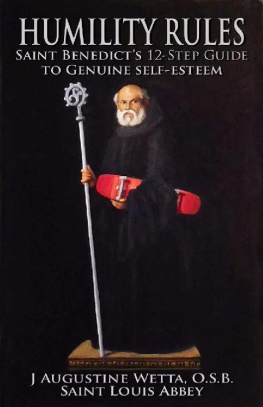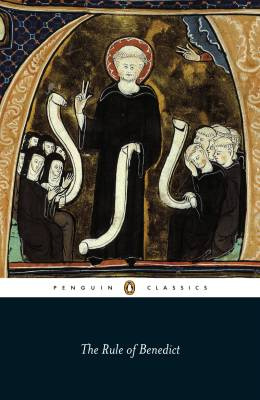T HE R ADICAL C HRISTIAN L IFE
A Year with Saint Benedict
Joan Chittister

LITURGICAL PRESS
Collegeville, Minnesota
www.litpress.org
Cover design by Ann Blattner. Saint Benedict, sculpture by Peter Watts, housed at Gethsemane Abbey, Kentucky. Photo by Brother Patrick Hart, ocso. Used with permission.
2011 by Order of Saint Benedict, Collegeville, Minnesota. All rights reserved. No part of this book may be reproduced in any form, by print, microfilm, microfiche, mechanical recording, photocopying, translation, or by any other means, known or yet unknown, for any purpose except brief quotations in reviews, without the previous written permission of Liturgical Press, Saint Johns Abbey, PO Box 7500, Collegeville, Minnesota 56321-7500. Printed in the United States of America.

Library of Congress Cataloging-in-Publication Data
Chittister, Joan.
The radical Christian life : a year with Saint Benedict / Joan Chittister.
p. cm.
ISBN 978-0-8146-3365-6 ISBN 978-0-8146-3955-9 (e-book)
1. Benedict, Saint, Abbot of Monte CassinoMeditations. 2. Devotional calendarsCatholic Church. 3. Christian lifeCatholic authors. I. Title.
BR1720.B45C55 2011
242.2dc22
2011016240
C ONTENTS
An Exercise in Spiritual Imagination
T HE M ENDING OF A T RAY
A Call to Good Work
S CHOLASTICA AND B ENEDICT
A Call to Conversion of Heart
C AVE AND R OMANUS
A Call to Silence and Sacred Leisure
P OISONING OF W INE
A Call to Purity of Heart
P LACID AND M AURUS AND THE M OVEMENT OF M ONASTERY
A Call to Community
N EAR D ROWNING OF P LACID
A Call to Friendship
F OUNDING OF M ONTE C ASSINO
A Call to Prophesy
T OTILA THE G OTH
A Call to Humility
A GAPITUS AND V IALS OF O IL
A Call to Stewardship
G OTH AND P OOR M AN
A Call to Peace and Nonviolence
C HILD R AISED FROM THE D EAD
A Call to Justice and Compassion
W ORLD IN A R AY OF L IGHT
A Call to Contemplative Vision
T HE R ADICAL C HRISTIAN L IFE
An Exercise in Spiritual Imagination
There are two stories, one from the Sufi masters and one from the monastics of the desert, that may have a great deal to tell us about what it means to live a radical Christian life in our own times.
In the first, the Sufi tell about a spiritual elder who asked the disciples to name what was the most important quality in life: wisdom or action? Its action, of course, the disciples said. After all, of what use is wisdom that does not show itself in action? Ah, yes, the master said, but of what use is action that proceeds from an unenlightened heart? Or to put it another way, busyness alone is not enough to qualify us as a spiritual people. We must be busy about the right things.
In the second story from the desert monastics, Abba Poemen says of Abba John that John had prayed to God to take his passions away so that he might become free from care. And, in fact, Abba John reported to him, I now find myself in total peace, without an enemy. But Abba Poemen said to him, Really? Well, in that case, go and beg God to stir up warfare within you again for it is by warfare that the soul makes progress. And after that when warfare came Abba John no longer prayed that it might be taken away. Now he simply prayed: Lord, give me the strength for the fight.
Point: We are not meant to be long-distance observers of life. We are to give ourselves to the shaping of it, however difficult that may be in this day and age.
This commitment to co-creation is a great task, a noble task for which to give a life, but it is not a simple one. We are at a crossover moment in timesomewhere between the certainty of the past, the demands of the present, and the possibility of the future. It is a moment again in human history that needs deep wisdom and requires holy struggle.
At the dawn of the twenty-first century, the world is shifting. In fact, the world is dizzyingly mobile now. As a culture, we are shifting away from being isolationist and independent to being global and interdependent.
It is a world where Catholic and Protestant have melted into simply being Christians together and our new neighbors and their temples, monasteries, and mosques are Hindu, Buddhist, Jewish, and Muslim.
Our task now is to be radical Christian communitiesin the here and nownot fossils of a bygone reality, not leftovers from an earlier golden age. Now we need new wisdom and a new kind of struggle to determine what we must be and do in the midst of these changing times.
Our choices are clear: We can go forward again and become something new in order to leaven the new or we can go backward in an attempt to maintain what we know better but which is already gone.
The question is then: What does it mean to be a radical Christian community in times such as these? And how do we do it?
The choice is ours. But, dont be fooled: not only is it not an easy choice; it is not an easy task.
The very map of the world is changing as we stand here: People are starving to death on the television screens in our family rooms. People who have worked hard all their lives fear for their retirement while we continue to put more money into instruments of destruction in this society than we do into programs for human development. The economy is in a state of skew. Only those who do not have to work are really making money. And, at the same time, there are a growing number of very rich and an even greater number of very, very poor.
Life is counted as nothing. Abortion is the most popular form of birth control in developing countries.
Hundreds, thousands, of civilians everywheremost of them women and childrendie in wars that men design to protect them. And we continue to practice capital punishment even though we know that this so-called deterrence, which makes us just like what we hate, does not deter. In fact, the ten states without capital punishment have lower murder rates than those that do.
Christians, serious seekers, now must choose either to retire from this fray into some paradise of marshmallow pieties where they can massage away the questions of the time, the injustice of the age, with spiritual nosegays and protests of powerlessnesswhere they can live like pious moles in the heart of a twisted world and call that travesty peace and religionor they can gather their strength for the struggle it will take to bring this world closer to the reign of God now.
But what can possibly be done in this runaway world of the powerful few by the rest of us who hold no malice and want no wars, who have no influence but hold high ideals, who call ourselves Christian and claim to mean it!
Who are we now? And who do we want to be?
Most of all, where can we possibly go for a model of how to begin to be a radical Christian witness in a society in which we are almost totally remote from its centers of power and totally outside its centers of influence?
My suggestion is that we stop drawing our sense of human effectiveness from the periods of exploration and their destruction of native peoples, or from the period of industrialization and its displacement of people, or from the periods of the world wars and their extermination of peoples.

